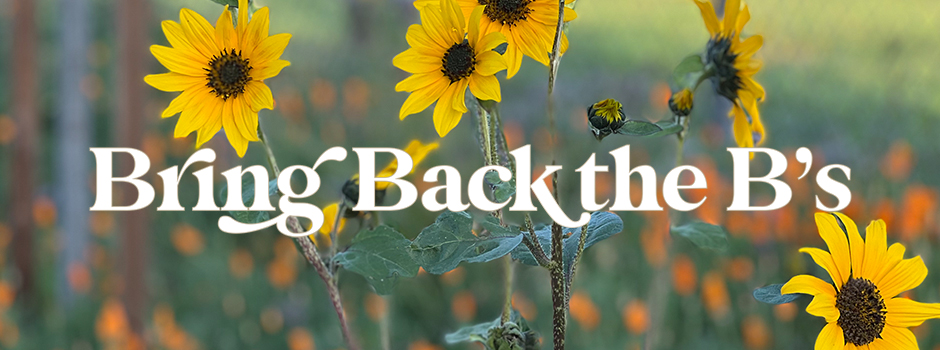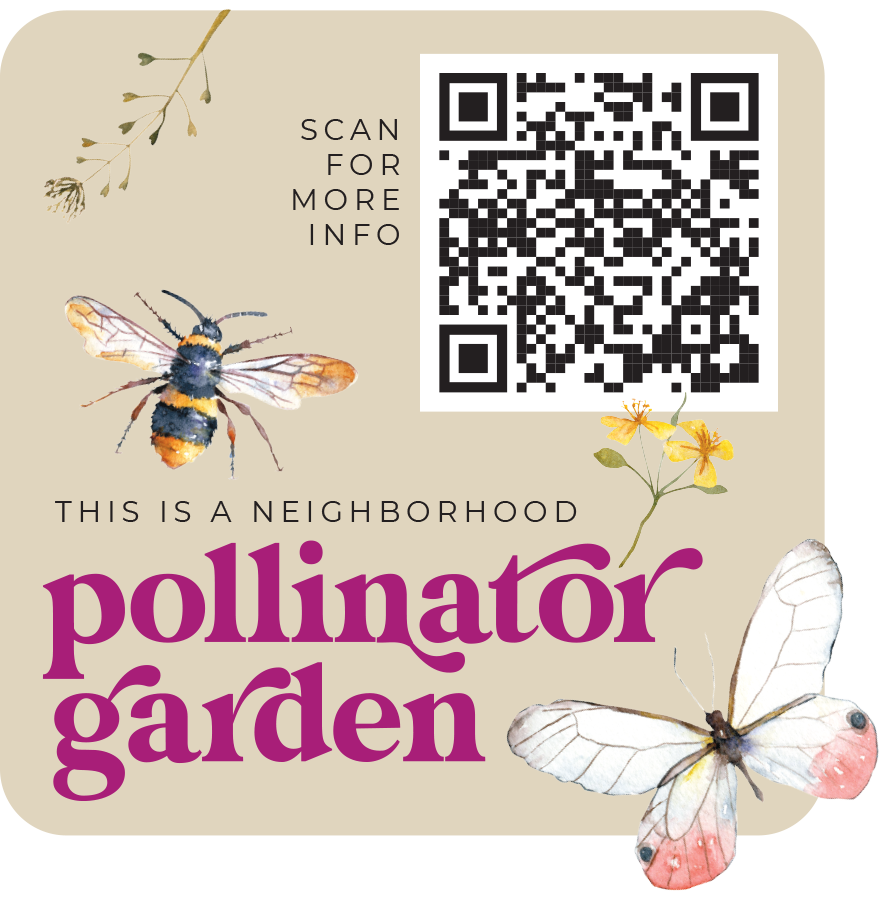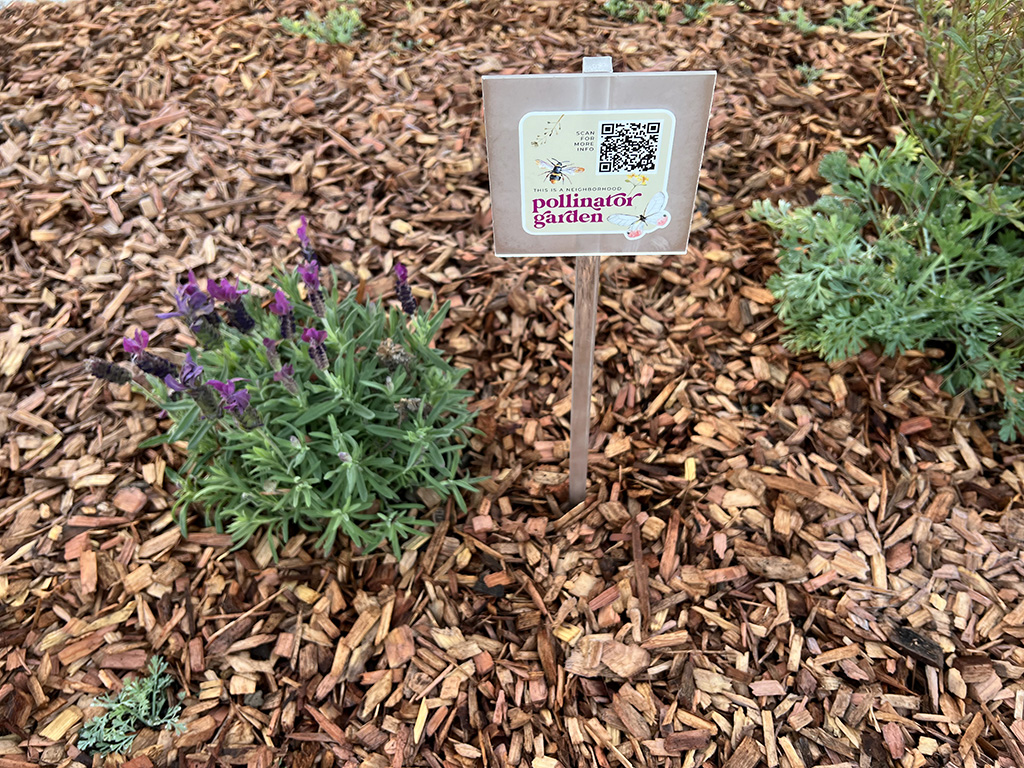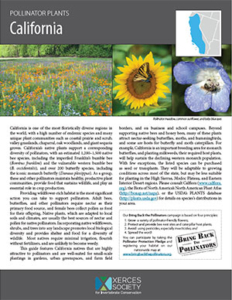2022 Grant: Bring Back the B’s
Overview
Our 2022 grant project explores how we can establish or expand healthy habitats for pollinators – whether by eliminating toxins or by choosing plants that attract and nourish butterflies and bees.
Providing a wildflower-rich habitat is the most significant action you can take to support pollinators. Adult bees, butterflies, and other pollinators require nectar as their primary food source, and female bees collect pollen as food for their offspring. Native plants, which are adapted to local soils and climates, are usually the best sources of nectar and pollen for native pollinators. Incorporating native wildflowers, shrubs and trees into any landscape promotes local biological diversity and provides shelter and food for a diversity of wildlife. Most natives require minimal irrigation, flourish without fertilizers, and are unlikely to become weedy. (Source: Xerces Society for Invertebrate Conservation).
February 2023 update: Interactive Pollinator Garden Map is live! See below.
Visit our pollinator gardens!
PART 1 (Oct/Nov 2022)
Survey Cherryhill residents to create a baseline count of the approximate number of pollinator plants currently growing in the neighborhood as well as an estimated use of pesticide products. Please take a moment and fill out the survey form below. Note: This is a great project for children; have them help you count your bee and butterfly friendly plants!
PART 2 (Dec 2022)
Increase our footprint as a pollinator-friendly area by seeding/planting mini pollinator demonstration gardens throughout Cherryhill (mainly in front yards or parking strips). Please volunteer to host (or co-host) a pollinator space in front of your home. Garden hosts will receive seeds and plants as well as a minimalist, attractive sign (our pollinator garden stickers mounted on clear acrylic) that contains a QR code to learn more about wildflower garden spaces in Cherryhill. Ideally, we’ll build an interactive map that shows all the pollinator-friendly gardens in the neighborhood.
PART 3 (March 2023)
Re-survey residents to ascertain the increase in number of pollinator-friendly plants in Cherryhill. In addition, we’ll host a walking tour in the spring to see how the gardens have bloomed and what bee/butterfly activity we can observe.
There are two types of gardens we will focus on (gardens may be a mix of both):
- Native plants that provide food and potential shelter for solitary bee species. Solitary bees do not live in colonies, they look for hollowed out areas to lay their eggs. Although solitary bees do not produce honey, they are exceptional pollinators and are less susceptible to diseases like colony collapse disorder.
- Native plants that provide food and nesting areas for Monarch butterflies, which travel between California and Mexico every year. According to Gardners.com, spring is the beginning of the monarch’s breeding season, and milkweed is crucial to survival of the species. Many flowers, especially native plants, are terrific sources of nectar for monarch butterflies, but milkweed leaves are the only food monarch caterpillars eat. Monarchs butterflies lay their eggs on milkweed plants so the tiny caterpillars will have access to food the moment they hatch.
We plan to register our garden areas with the Million Pollinator Garden Challenge website (www.millionpollinatorgardens.org) as well as provide helpful website links for more information about everyday actions we can take to support pollinators. Even though the million garden milestone was achieved in 2018, the site still accepts garden entries to continue building the nationwide map. At present, we can only find 3 registered gardens in Sunnyvale so going from 3 to a multitude will be significant.
How can you get involved?
- Take our Survey (below).
- Help us spread the word about our “Bring Back the B’s” effort!
- Host a mini garden in your front yard or along the parking strip (for best results, gardens need to be in the ground, not in planters). Note: We are asking residents to clear a small space (approximately 3 feet by 3 feet) that receives full sun throughout most of the day in order to host a mini pollinator garden. Plants, seeds, etc. will be provided at no charge (we will use grant funds to pay for materials). If you want to participate but need help clearing a space, please let us know.
- Volunteer to help build hexagonal demo gardens to spread throughout the neighborhood.
- Volunteer to help scatter wildflower seeds for residents who do not have time to do so but want to participate.
- Submit your photos, videos and commentary to our grant team… we want to know what is ‘growing on’ in your garden!
Register a CNA Pollinator Garden
Registered gardens will receive the above sticker (mounted on clear acrylic).
Look for the Pollinator Garden signs throughout the neighborhood!
Survey – Do you currently have pollinator plants in your garden?
Not sure? Check out these guides from the Xerces Society. Pollinator Plants: California and Monarch Nectar Plants: California (both have helpful thumbnail photos to identify plant species).
Pollinator Plant Survey
Survey – Pesticide/Herbicide use
This survey is ANONYMOUS. We want a baseline count of households using pesticides only. If you choose to eliminate pesticide use after participating in grant activities, we will provide instructions on how to do so in a safe, anonymous manner.





